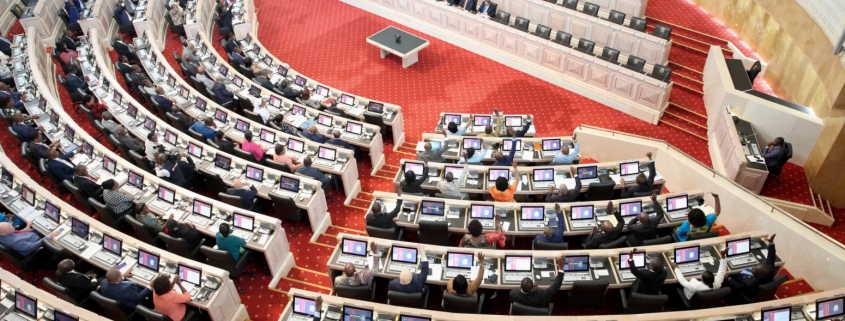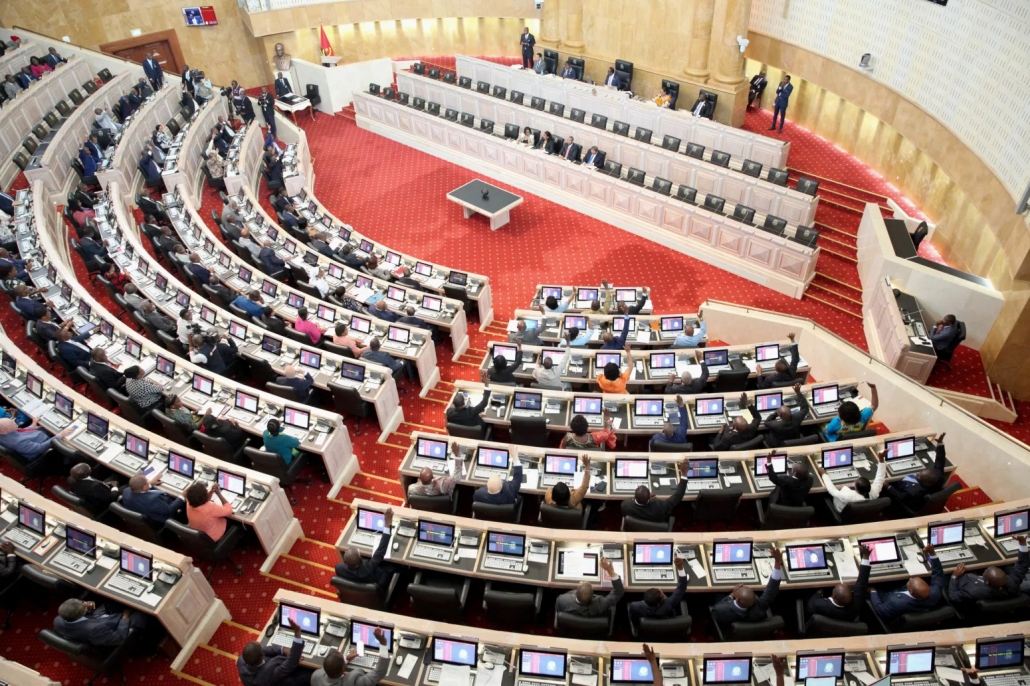The importance of the new article 37, paragraphs 4 and 5 of the Angolan Constitution: Non-conviction-based (NCB) asset forfeiture

1–Introduction. The Angolan constitutional review, the limits to the right to property and the fight against corruption
One of the main themes of the Angolan constitutional review underway was the delimitation of the right to property, a issue that has become controversial in light of the developments in the processes of combating corruption.
Recently, as an example, we listed the following concrete measures that in some way put the property right of private entities in question. Regarding the “freezing” of assets, assets of Manuel Vicente and Generals Dino and Kopelipa, Jaoquim Sebastião, Manuel Rabelais, among others, were seized or handed over. About Generals Dino and Kopelipa, it is noted that, as representatives of the companies China International Fund Angola — CIF and Cochan, SA, they handed over the shares they held in the company Biocom-Companhia de Bionergia de Angoala, Lda., in the network from Kero Supermarkets and at Damer Gráficas-Sociedade Industrial de Artes Gráficas SA. In relation to Manuel Vicente, the President of the Republic determined the nationalization of 60% of the shareholdings of the commercial company Miramar Empreendimentos, SA”, which covers “43% of the shares belonging to Sociedade Suninvest — Investimentos, Participações e Empreendimentos, SA” and “17% of shares owned by Sommis, SGPS. These shares will belong to Manuel Vicente. Obviously, it is also worth mentioning the restraint of assets referring to Isabel dos Santos and her associates in civil proceedings in Luanda and in criminal proceedings in Lisbon, in addition to the nationalization of Efacec in Portugal[1].
The legal formulas for the seizure of assets were diverse, generally provisional, although in some cases definitive and with the apparent acquiescence of the interested parties. Here the exception is Efacec, whose nationalization in Portugal was equally definitive, but without agreement from the interested party, Isabel dos Santos.
In one way or another, in Angola the procedures have become somewhat confusing, not realizing exactly the global legal effect of the voluntary delivery of goods and its legal stability, and in cases of provisionally seizure, problems arise in the management and maintenance of assets. It is also essential not to let these temporary situations prolong for too long, especially when the fundamental interests of the economy are at stake or jobs at risk.
In view of these events, a clear definition of the constitutional and legal regime for public seizures in Angola became urgent, to provide legal and economic security to the several movements for the recovery of assets described and in progress. This is the meaning of the text that eventually emerged in the constitutional review and that we are going to describe, adding the legal possibilities that this new text opens in terms of legislation with a view to making the asset recovery process faster, more understandable and solid.
2-Article 37 of the Angolan Constitution (ARC)
The 2010 version of the ARC, still in force, guaranteed the property right and defined the conditions for requisition and expropriation in its article 37.º. There, it was established in nº. 1 that: “Everyone is guaranteed the right to private property and its transmission, under the terms of the Constitution and the law.”. Nº. 2 stated that “The State respects and protects the property and other real rights of individuals, legal entities and local communities, only temporary civil requisition and expropriation for public utility being allowed, upon fair and prompt compensation, in the terms of the Constitution and the law.” And number 3 tightened the loop, demanding that “The payment of the compensation referred to in the previous number is a condition of effective expropriation.”
This was an article clearly framed in a liberal and absolute vision of property, not even foreseeing the possibility of nationalization or confiscation, admitting only the expropriation for public utility subject to the payment of compensation, to be effective. On paper, it would be difficult to have a more absolute guarantee of the right to property, and so the current activities of Angola’s National Asset Recovery Service (ANARS) could often touch the constitutional margins, with many of the seizures carried out lacking constitutional validity. Naturally, this fact must have been alerted to the President of the Republic, who took charge in his proposal for a constitutional review to remedy this grey area that was being created by the action of the ANARS. Thus, the President proposed the addition to article 37 of the Constitution of paragraph 4, which would have the following wording:
4. A specific law defines the conditions under which the nationalization of private assets may occur for ponderous reasons of national interest and confiscation for serious offense against laws that protect the economic interests of the State.
This version expressly established the possibility of nationalization or confiscation when there were fundamental reasons for this to happen. It would be up to the law to define the reasons. Thus, the constitutional regularity of asset recovery activities that had previously raised doubts was enshrined.
However, several Angolan jurists raised the problem that this presidential formulation could frighten potential foreign (and national) investors, so necessary for economic recovery by allowing a broad and indeterminate basis for proceeding with the nationalization and confiscation of assets. This possibility would be overstated and without adequate safeguards. That must have been why article 37, after analysis and deliberation in the National Assembly (NA), ended up with two more numbers, the 4th and 5th. Thus, the following wording was defined:
Article 37
(Right and limits of private property)
1. […].
2. […].
3. […].
4. Movable and immovable goods and shareholdings of private individual and corporate persons, in whole or in part, may be subject to public appropriation, when, for reasons of national interest, national security, food safety, public health, the economic and financial system, the supply of goods or the provision of essential services are at stake.
5. Proper law regulates the regime of public appropriation, under the terms of the previous number.
We are not going to enter into a doctrinal discussion about what is meant by “movable and immovable goods and shareholdings” and whether all the possible assets are included, although a clearer formulation that would not raise any kind of doubts would have been better.
What is clear from this article is that there may be public appropriation, ie, a “situation that (…) allows an action on the ownership of the means of production, which will lead to a coercive transfer of these goods to the public sector[2]” and that this appropriation must be justified by reasons of national interest, which the Constitution exemplifies as national security, food security, public health, economic and financial system, supply of goods or provision of essential services. Note that these are mere illustrations that the constitutional norm gives us. In fact, any motive in the national interest will be grounds for public appropriation. From the entry into force of this text, there will be, without any doubt, a general constitutional framework for asset recovery. Let’s see in what terms and what perspectives unfold.
3-The concept of public appropriation
In the absence of any other reference, it seems that the Angolan legislator was inspired by article 83 of the Portuguese Constitution (PC) to introduce the concept of public appropriation instead of nationalization and confiscation. Article 83 of the PC states: “The law determines the means and forms of intervention and public appropriation of the means of production, as well as the criteria for setting the corresponding compensation.”
From the outset, a clear difference between the Angolan and Portuguese norms regarding public appropriation can be seen. In Portugal, any form of public appropriation implies compensation, This is not the case in Angola.
We will detail the regime that appears to be established in the ARC, after the review. Public appropriation will be any coercive transfer of ownership of a good or private participation to the sphere of the State. Public appropriation encompasses nationalization, confiscation, expropriation and all other possibilities of empowerment. In the specific case of expropriation for public utility, the Constitution requires that compensation be made. In other cases, there is no such constitutional requirement. That is, for reasons of national interest the State can withdraw a property from the private sphere without compensation. The fact that the ARC admits this possibility should oblige the ordinary legislator to quickly draw up a law on the basis of public appropriation to guarantee the legal certainty of these situations, as far as possible.
4- The constitutionalization of non-conviction-based (NCB) asset forfeiture
Non-conviction-based (NCB) asset forfeiture is a critical tool for recovering assets arising from corruption when a criminal conviction is not possible[3]. Examples are when the offender has died, has fled jurisdiction, is immune from prosecution or the criminal process is anticipated to be too long rendering it ineffective. The United Nations Convention against Corruption (UNCAC) and the Financial Action Task Force (FATF) support its use.
The confiscation of NCB assets is a critical tool to recover the proceeds and instruments of corruption. It is a legal mechanism that provides for the containment, seizure and confiscation of embezzled assets without the need for criminal conviction. A growing number of jurisdictions have established NCB asset forfeiture regimes and such regimes have been recommended at the regional and multilateral level by a number of organizations, notably the World Bank through the StAR Initiative and the aforementioned FATF.
Globally, there are two types of confiscation used to recover illicitly obtained assets: NCB asset confiscation and criminal confiscation. Where criminal asset forfeiture and the NCB differ is in the procedure used to confiscate assets. The main distinction between the two is that criminal confiscation requires a criminal trial and conviction, while confiscation of NCB assets does not. In fact, it can be done through a quick civil or even administrative procedure. This is the possibility that the review of the Constitution has just admitted.
5-Conclusions. Non-conviction-based (NCB) asset forfeiture and the need for a basic law
What is essential from this constitutional modification provided for in article 37 of the ARC is the opening of dynamic possibilities for the implementation in civil or administrative proceedings of the confiscation of assets obtained illegally without the need for criminal proceedings and without compensation, therefore, we have here a large and positive step in the fight against corruption.
However, the constitutional provision immediately requires, for reasons of legal security and guarantee of the right to property, the approval of a basic law on the public appropriation of assets, specifically containing specific provisions on confiscation without criminal conviction. Consequently, after the constitutional review comes into force, it will be time for a basic law on confiscation of assets without criminal conviction and compensation.
[1] https://www.cedesa.pt/2021/05/13/radiografia-do-combate-a-corrupcao-em-angola/
[2] DIOGO SARAMAGO FERREIRA, A nacionalização do Banco Português de Negócios – Análise da Lei n.° 62-A/2008, de 11 de Novembro, Revista de Direito das Sociedades, 2011-1 (169-186), 176
[3] Theodore S. Greenberg, Linda M. Samuel, Wingate Grant, Larissa Gray (2009), Stolen Asset Recovery A Good Practices Guide for Non-Conviction Based Asset Forfeiture, The World Bank, Washington DC.
https://star.worldbank.org/sites/star/files/Non%20Conviction%20Based%20Asset%20Forfeiture.pdf



